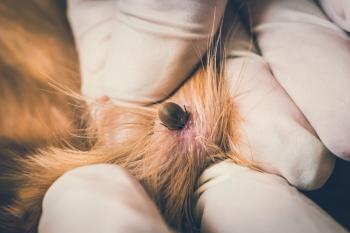
'Tissue chips' offer possible alternative to human and animal testing
Tiny bioengineered systems may offer a new approach to drug safety and efficacy testing.
Researchers with a tissue chip. Images courtesy of College of Veterinary Medicine & Biomedical Sciences, Texas A&M UniversityTexas A&M University is helping to test tissue chips-an alternative to human and animal testing-designed to test the safety and efficacy of drugs, according to a university press release.
Dr. Ivan Rusyn, professor of veterinary integrative biosciences at Texas A&M University, who is leading the team of investigators and staff, explained that tissue chips are tiny bioengineered systems that mimic the larger complex organs and tissues of the human body.
"This work will help facilitate the use of tissue chips for drug and chemical testing in both the United States and Europe," Rusyn says in the release. "The chips may improve our ability to ensure that a drug is safe before clinical trials begin and could ultimately replace drug testing in humans and animals."
A $4.2-million-dollar grant from the National Institutes of Health's (NIH) National Center for Advancing Translation Sciences (NCATS) will help the university establish the Texas A&M Tissue Chip Validation Center. The center will test and validate the devices in concert with tissue chip developers at other universities and companies.
The NCATS Tissue Chip for Drug Screening program launched in 2012 with a goal to develop 3D human tissue platforms, or chips, that model the structure and function of human organs, such as the lung, liver and heart, and then combine these chips into an integrated system that can mimic complex functions of the human body, according to NCAT's program overview.
Researchers hope that the tissue chips will serve to more accurately imitate whole human tissues and organs than the conventional tissue culture approach.
Vanderbilt NVU chip, a blood-brain-barrier chip. Photo courtesy of Vanderbilt.
Lung chip. Photo courtesy of the Wyss Institute.
Kidney on a chip. Photo courtesy of Nortis.
Newsletter
From exam room tips to practice management insights, get trusted veterinary news delivered straight to your inbox—subscribe to dvm360.






